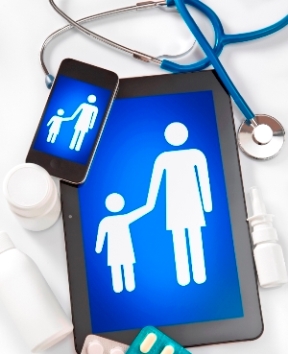By Rahul Konapur, Nachiket Gudi, Oommen John
Rahul Konapur, Young India Fellow, Ashoka University, Sonepat, Haryana.
Nachiket Gudi, Consultant, The George Institute for Global Health, India
Oommen John, Senior Research Fellow, The George Institute for Global Health, India
Countries across the globe have been devastated by the COVID-19 pandemic caused by the SARS-CoV-2 virus. Over the span of a year 2,320,497 lives have been lost and 106,125,682 infected as on date1. The scientific community across the globe are racing against time to administer safe and effective vaccines to save lives and livelihoods. As the pandemic spread across the globe, strict border closures and travel restrictions have brought the aviation industry to a standstill. According to WHO, 194 countries implemented visa restrictions and 143 closed their borders in early April, thereby halting the cross-border movement2.
Centres for Disease Control and Prevention (CDC) has highlighted that ‘social distancing is difficult on crowded flights, and sitting within 6 feet of others, sometimes for hours, may increase your risk of getting COVID-19’3. Although some data suggest that the chance of contracting COVID-19 during flights is less than 1%, citizens across the globe are avoiding air travel. Efforts have to be made to minimize risk and maximize safety of the passengers4.
Recently, The Commons Project and World Economic Forum jointly announced the ‘Common Pass’ that aims to make cross-border travel safer5. It is a globally interoperable platform that allows people to digitally document their COVID-19 related information such as health declarations, lab results to meet the entry requirements of the country to which they are travelling. The platform also assesses whether the individual’s lab test results or vaccination records come from a trusted source. It also allows the countries to update the screening requirements as and when the research progresses. The platform complies with the General Data Protection Regulation (GDPR).
How does it work?
The governments define a set of requirements for entering the country which is uploaded to the common pass standard format. The passenger who wishes to travel gets tested in the common pass enabled laboratories and the labs upload the results onto the platform. Only certified labs have the access to upload the information. The results then get converted to scannable QR code which confirms that the passenger is safe to travel. The app aims to replace the existing printed declarations that people present in the airport as their legitimacy cannot be confirmed in any way. Earlier in august 2020, IBM proposed with a similar intervention titled ‘digital health pass’ which is aimed at supporting organisations to re-open their businesses safely6.
How different is it from the immunity passport?
Immunity passports, which can be in the form of certificate, wrist band or a mobile based application, document that the concerned person is immune against a disease and is highly unlikely to spread it. In the month of April 2020, WHO issued a statement cautioning against immunity passports7. It stated that “There is currently no evidence that people who have recovered from COVID-19 and have antibodies are protected from a second infection”. While immunity passports certify that a person is immune to a disease, common pass just tells you that the person tested negative for COVID-19.
The International Air Transport Association (IATA) has also rolled out its mobile app ‘Travel Pass’ to facilitate the ease of travelling while not compromising on safety8. The app is built on four independent interoperable components which includes creating a digital passport and is expected to be made available for public use in the first quarter of 2021.
The corona virus will continue to impact us for some more time and there might be future pandemics unknown to us. Here are a few ways through which applications like common pass could be successfully implemented across the world
- The governments have to agree on standard protocols for conducting tests (PCR tests) and sharing of vaccination reports.
- There is no standard, globally acceptable format for lab results as of now. Therefore, it is quite a challenge to validate the health status of individuals from different countries.
- Since there is no evidence on how long one can be immune against Covid-19, validity period of these lab tests should therefore be established.
Digital health interventions have witnessed a fast-paced adoption ever since COVID-19. The world has also seen the emergence of many such interventions in the form of trackers and the hype still continues. This ‘techno fix’ mindset, however has encountered grave challenges in the form of privacy and data protection. Recently Amnesty International called out the contact tracing apps launched by governments of Norway, Kuwait and Bahrain as the most dangerous in the world for breaching the privacy of individuals9. This also led the Norwegian government to withdraw the app from public domain. The UK’s ‘world beating’ contact tracing app has also faced similar consequences10.
What is the way forward?
The common pass has currently been tested on the Trans-Atlantic route between London and Newark airports. Similar trials should be conducted across different geographical locations to generate more evidence. Applications like common pass will have a significant role to play in the overall unlock. Apart from the aviation, sectors like Tourism, Hospitality, Entertainment and Fitness have been hardly hit due to the pandemic11. Elder care homes were also majorly affected as evidence reports that half of the recorded COVID-19 deaths in some nations came from these clusters12. Having reliable lab and vaccination records on the go and making it a part of new normal will not only be cost effective to the businesses but also have a profound effect on unlocking the world and rebuilding the economy.
Education is also one of the hard-hit sectors due to the pandemic. While a lot of them are opening in limited capacities, positive cases have been reported in the various parts of the country13,14. Therefore, applications like these can be employed in higher education institutions and residential settings. Furthermore, they can also be employed in places of mass gatherings like Marathon races, Olympic stadiums and other sports venues, conferences and inter-country transport and make it a part of the new normal so that the world unlocks in a safe and secure manner.
References
- WHO Coronavirus Disease (COVID-19) Dashboard [Internet]. Covid19.who.int. 2021 [cited 10 February 2021]. Available from: https://covid19.who.int/
- Weekly operational update on COVID-19 – 15 April 2020 [Internet]. Who.int. 2021 [cited 26 January 2021]. Available from: https://www.who.int/publications/m/item/weekly-update-on-covid-19—15-april-2020
- COVID-19 and Your Health [Internet]. Centers for Disease Control and Prevention. 2021 [cited 26 January 2021]. Available from: https://www.cdc.gov/coronavirus/2019-ncov/travelers/travel-during-covid19.html
- . Bloomberg – Are you a robot? [Internet]. Bloomberg.com. 2021 [cited 26 January 2021]. Available from: https://www.bloomberg.com/news/articles/2020-09-28/covid-on-planes-delta-american-united-jetblue-recovery-plans
- The Commons Project | Unlocking the full potential of technology and data for the common good. [Internet]. The Commons Project. 2021 [cited 26 January 2021]. Available from: https://thecommonsproject.org/
- Piscini E. IBM Digital Health Pass puts privacy first – Watson Health Perspectives [Internet]. Watson Health Perspectives. 2021 [cited 10 February 2021]. Available from: https://www.ibm.com/blogs/watson-health/health-pass-puts-privacy-first/
- “Immunity passports” in the context of COVID-19 [Internet]. Who.int. 2021 [cited 26 January 2021]. Available from: https://www.who.int/news-room/commentaries/detail/immunity-passports-in-the-context-of-covid-19
- IATA Unveils Key Design Elements of IATA Travel Pass [Internet]. Iata.org. 2021 [cited 26 January 2021]. Available from: https://www.iata.org/en/pressroom/pr/2020-12-16-01/
- Bahrain, Kuwait and Norway contact tracing apps a danger for privacy [Internet]. Amnesty.org. 2021 [cited 26 January 2021]. Available from: https://www.amnesty.org/en/latest/news/2020/06/bahrain-kuwait-norway-contact-tracing-apps-danger-for-privacy
- The UK’s contact tracing app fiasco is a master class in mismanagement [Internet]. MIT Technology Review. 2021 [cited 26 January 2021]. Available from: https://www.technologyreview.com/2020/06/19/1004190/uk-covid-contact-tracing-app-fiasco
- 20.5 million people lost their jobs in April. Here are the 10 worst-hit jobs that were decimated. [Internet]. Business Insider. 2021 [cited 26 January 2021]. Available from: https://www.businessinsider.in/careers/news/20-5-million-people-lost-their-jobs-in-april-here-are-the-10-worst-hit-jobs-that-were-decimated-/slidelist/75697279.cms#slideid=75697395
- As covid-19 cases surge, global study paints grim picture for elder-care homes [Internet]. 2021 [cited 10 February 2021]. Available from: https://www.washingtonpost.com/world/2020/10/15/long-term-elder-care-coronavirus-nursing-homes-research-lessons/
- Outbreak C. Covid-19: 575 students, 829 teachers test positive after schools reopen in Andhra Pradesh [Internet]. India Today. 2021 [cited 10 February 2021]. Available from: https://www.indiatoday.in/coronavirus-outbreak/story/covid-19-262-students-160-teachers-test-positive-after-schools-reopen-in-andhra-pradesh-1738262-2020-11-05
- Bhat P. Manipal institute reports 69 COVID-19 cases since students returned to campus in Nov [Internet]. The News Minute. 2021 [cited 10 February 2021]. Available from: https://www.thenewsminute.com/article/manipal-institute-reports-69-covid-19-cases-students-returned-campus-nov-139860.








